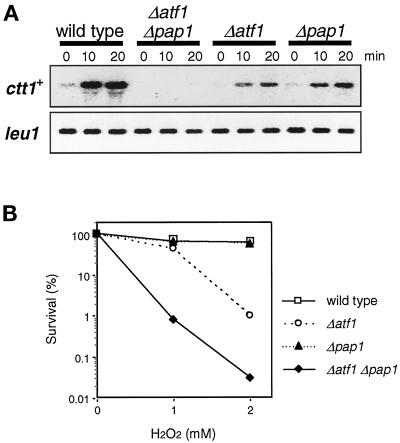Figure 8.
Two transcription factors, Atf1 and Pap1, regulate expression of ctt1+ in response to oxidative stress. (A) Wild-type (PR109), Δatf1 (KS1497), Δpap1 (TP108-3c), and Δatf1 Δpap1 (CA334) strains were grown to midlog phase in YES medium at 30°C and treated with 0.3 mM H2O2. Aliquots of cells were harvested at the indicated times for Northern hybridization analysis with the ctt1+ and leu1+ probes. Compared with wild-type cells, ctt1+ expression after oxidative stress was significantly impaired in Δatf1 and Δpap1 mutants and was not detectable in Δatf1 Δpap1 double mutants. (B) The strains used in A were grown to midlog phase in YES medium at 30°C, and H2O2 was added at concentrations of 0, 1, and 2 mM. After 1 h of incubation at 30°C, cells were washed, diluted, and plated on YES agar medium. The survival of each strain was evaluated in terms of its colony-forming ability after 3 d of incubation at 30°C. Results from an average of three independent experiments are shown. The Δatf1 mutant showed higher sensitivity to H2O2 than the wild-type cells, and this sensitivity was further accentuated in the Δpap1 background.

